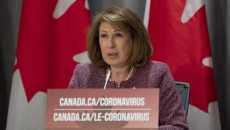BURNABY, B.C. - The British Columbia government announced a $500-million fund Thursday to help the non-profit housing sector purchase rental buildings and save them from "housing speculators and profiteers," whose property flips often lead to tenant evictions.
Premier David Eby said the rental protection fund will preserve affordable rental buildings for tenants who have faced higher rents or evictions when their buildings are bought, redeveloped and sold.
"For too long, this housing crisis has worked to the benefit of speculators and investors instead of people looking for a place to live," Eby said at a news conference. "Increasingly, we're seeing across Canada and in B.C. large international corporations buying up rental buildings, speculating to earn investment income on homes that people count on (for) affordable rents."
Join Premier David Eby; Ravi Kahlon, Minister of Housing; Spencer Chandra Herbert, chair of the Rental Housing Task Force; and partners for an announcement about new actions to protect rental housing in BC. https://t.co/7kv0QBfxL8
— BC Government News (@BCGovNews) January 12, 2023
The fund will provide one-time grants to non-profit housing organizations to help them buy residential rental buildings and housing co-ops listed for sale to protect the renters and preserve the affordable units for the future, he said.
The premier says they'll also support the non-profit purchasers in obtaining private financing and the income generated by the current rents will cover the loan and operating costs of the building.
The fund will be managed by an external body, the Housing Protection Fund Society, which is made up of the BC Non-Profit Housing Association, Co-operative Housing Federation B.C. and the Aboriginal Housing Management Association.
Eby, who did not provide an estimate of how many potential buildings and renters the fund could help, said it is expected to protect thousands of affordable housing units.
The NDP government's Housing Ministry cited 2021 census data reporting 669,450 rental households in B.C., about one-third of all households.in the province.
Eby said the government is also considering legislation that would give non-profits the first right of refusal in potential real estate transactions involving affordable rental properties.
But the possible legislation would not be introduced in the coming spring session of the legislature, he said.
"In too many cases, this predatory model leads to evictions and rent hikes and can lead to homelessness," Eby said. "There is no feeling worse than waking up in the morning and seeing a 'for sale' sign on the front lawn of the building you live in."
Representatives of B.C.'s non-profit housing sector applauded the government's fund, saying it will preserve affordable rental properties for many people who would likely face eviction and much higher rents if their building was sold to speculators.
"I know if you add 10 new homes and you lose 20, you're down 10 homes," said Thom Armstrong, Co-operative Housing Federation of B.C. chief executive officer. "That's the hole we've dug for ourselves, and this announcement is the shovel that's going to allow us to start digging back up."
The fund will help housing non-profits keep affordable rental properties available for tenants instead of losing them to more expensive units, he said.
"The idea behind this initiative is breathtakingly simple," said Armstrong. "If you want to protect a scarce and valuable asset, put it somewhere safe. The safest place you can put it is in the community housing sector."
The B.C. Real Estate Association was not immediately available for comment.
Jill Atkey, the CEO of the BC Non-Profit Housing Association, said the fund is addressing the erosion of affordability in the province's private rental market.
Between 2016 and 2021, B.C. lost 97,390 rental properties where rents were $1,000 a month or less, she said.
"This is happening right across our nation," Atkey said.
Investing in building more housing supply is critical but building more homes is no longer sufficient to solve B.C.'s housing crisis, said Atkey, which is why preserving affordable rental properties is "so vital."
Statistics Canada data released in September showed B.C. leading the country with the highest rate of unaffordable homes, due largely to people paying high rents to live in Vancouver.
Eby said he expected many property owners who have had long-term tenants in affordable buildings for sale will seriously consider accepting offers from non-profits.
"I think in many cases we're going to see sellers preferentially selling to the non-profit sector," he said.






